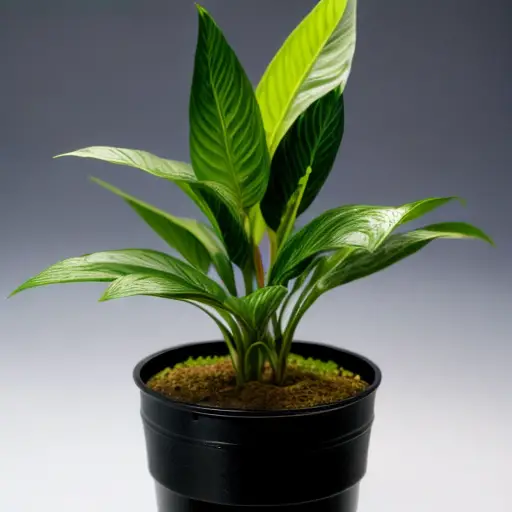Understanding the Aphelandra: A Guide to its Origins and Characteristics
Welcome, fellow plant enthusiasts, to the whimsical world of the Aphelandra! Prepare to embark on a journey that will leave you both mesmerized and slightly perplexed. Native to the tropical rainforests of South America, this vibrant beauty demands attention with its striking foliage and flamboyant personality. But fear not, dear readers, for understanding the Aphelandra is not as daunting as deciphering a cryptic crossword puzzle. To care for this diva of the plant kingdom, provide it with bright, indirect light, a warm and humid environment, and soil that remains slightly moist (but not soggy, unless you want to witness its dramatic fainting spells). Remember, dear green thumbs, the Aphelandra may be a bit high-maintenance, but its stunning presence and ability to brighten any room make it a worthy companion on your botanical adventures.
Creating the Ideal Environment: Providing Optimal Conditions for Aphelandra
An interesting fact about caring for an Aphelandra plant is that it thrives in high humidity environments, making it an ideal choice for bathrooms or kitchens. The plant's glossy, dark green leaves and vibrant yellow flowers not only add a touch of beauty to these spaces but also benefit from the naturally humid conditions found in these areas. So, if you're looking to create a tropical oasis in your home, the Aphelandra plant is a perfect choice!
Step into the world of the Aphelandra, where creating the ideal environment for this tropical treasure is key to its flourishing existence. Picture a scene straight out of a rainforest paradise, with dappled sunlight filtering through lush foliage. To cater to the Aphelandra's whims, place it in a spot that receives bright, indirect light, as direct sunlight may scorch its delicate leaves. Embrace the humidity, dear plant enthusiasts, by misting its surroundings or placing a tray of water nearby. As for its soil, ensure it remains consistently moist, but never allow it to become waterlogged, for the Aphelandra prefers a fine balance between hydration and suffocation. With a little TLC and attention to detail, you'll create an oasis where the Aphelandra can thrive and enchant all who lay eyes upon its resplendent beauty.
Nurturing Growth: Essential Care and Maintenance for Aphelandra

Nurturing the growth of the Aphelandra requires a delicate touch and a keen eye for its needs. First and foremost, ensure that this tropical beauty is planted in well-draining soil, as waterlogged roots can spell disaster. Regular watering is essential, but be mindful not to overdo it, as the Aphelandra prefers moist soil, not a soggy mess. Allow the top inch of soil to dry out before watering again, striking a balance between hydration and suffocation.
In addition to proper watering, providing the Aphelandra with a warm and humid environment is crucial for its well-being. Mist its leaves regularly to mimic the humid conditions of its native rainforest habitat. Alternatively, you can place a tray of water near the plant to increase the moisture in the air. Remember, a happy Aphelandra is one that feels like it's basking in the tropical sun, even if it's in the comfort of your living room.
To keep this diva of the plant kingdom looking its best, regular pruning is necessary. Trim away any yellowing or damaged leaves to promote new growth and maintain its vibrant appearance. Additionally, pinch back the tips of the stems to encourage bushier growth and prevent the plant from becoming leggy. With a little snip here and there, you'll help the Aphelandra maintain its compact and lush form.
Lastly, don't forget to feed your Aphelandra with a balanced fertilizer during the growing season. Choose a fertilizer specifically formulated for houseplants and follow the instructions on the packaging. This will provide the necessary nutrients to support its growth and keep its foliage looking lush and vibrant.
By following these essential care and maintenance tips, you'll be well on your way to nurturing the growth of your Aphelandra and enjoying its stunning beauty for years to come. So, embrace your inner plant parent and let the magic of the Aphelandra unfold in your home.
Troubleshooting Common Issues: Solutions for a Healthy Aphelandra
A fun fact about caring for aphelandra plants is that they love to be pampered with a little bit of humidity! To keep them happy and thriving, you can place a tray filled with water near the plant or mist its leaves regularly. Not only will this make your aphelandra feel like it's on a tropical vacation, but it will also help prevent any dryness or wilting. So go ahead, give your aphelandra a mini spa day!
Even the most devoted plant parents may encounter some hiccups along the way when caring for their Aphelandra. But fear not, for troubleshooting common issues is all part of the journey. If you notice yellowing leaves, it may be a sign of overwatering or inadequate drainage. Adjust your watering routine and ensure the soil has proper drainage to prevent root rot. On the other hand, if the leaves start to droop, it could be a cry for more water. Give your Aphelandra a good drink and monitor its response. If you spot tiny pests like aphids or spider mites, gently wipe the leaves with a damp cloth or use an organic insecticidal soap to keep these unwanted visitors at bay. Remember, dear plant enthusiasts, with a little detective work and some tender loving care, you can troubleshoot and overcome any obstacles that come your way, ensuring a healthy and thriving Aphelandra.

